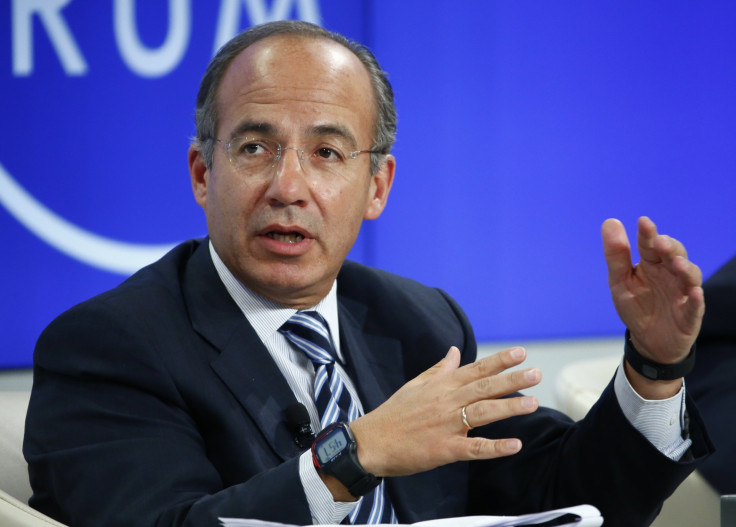Former Mexican President Says Most Undocumented Immigrants Don't Want To Become US Citizens

DAVOS, Switzerland -- The crackdown on illegal immigration combined with intensified border security has prompted large numbers of undocumented Mexican laborers to remain in the U.S. permanently -- even as many prefer to go home -- out of fear they will never be able to return, former Mexican President Felipe Calderon told International Business Times. In an interview on the sidelines of the World Economic Forum, Calderon, who was president from 2006 to 2012, characterized the primary motive of undocumented Mexican immigrants as economic.
Many are simply seeking to stay in the U.S. for a few years to earn money before returning home with cash to build houses and support families, he said. But the American border crackdown has made the crossing so treacherous and expensive, many unauthorized immigrants already in the U.S. are staying put rather than risk being shut out forever, Calderon said.
“Many of them are currently trapped,” Calderon told IBTimes. “There are a lot of these people [who] want to be in Mexico eight months every year, but they are unable to go there, because if they cross the border, they will never be able to cross back again.”
Calderon said he believes U.S. lawmakers should consider adding provisions to proposed immigration legislation that would permit “temporary work in a massive way,” but without giving immigrants automatic citizenship.
“I don’t believe that most of the Mexican workers looking for a job in the United States are wanting to be American citizens,” Calderon told IBTimes. “They are looking for an opportunity to get economic benefits and actually thinking when they are leaving [Mexico] what will be the way in which they can go back to their own home.”
Calderon argued American political groups opposed to undocmented immigration -- the kind that have backed statutes to toughen immigration enforcement, as reported by Reuters -- are prompting those already in the U.S. to stay and seek citizenship, even if that was not their initial goal.
“The American society, even the more conservative people, are getting exactly the contrary results that they were looking for,” he said. “In other words, anti-immigration laws are provoking millions of people living in the States that are unable to go back to their own countries. And they start to think, ‘Well if I need to stay here, it is better to do that all the way.’”
The former Mexican president’s comments came as Obama administration officials have started promising a renewed focus on making it more difficult for undocumented immigrants to enter the U.S., as reported by the Hill. This month, Obama pledged his administration is “going to be much more aggressive at the border in ensuring that people come through the system legally.” At the same time, Republicans in Congress are advancing a bill to spend $10 billion on new border security measures.
With the rise of the Islamic State group and its territorial ambitions in the Middle East one of the key issues debated at the World Economic Forum, Calderon also told IBTimes he believes there has been a major shift in national-security threats around the globe -- one he says he saw in Mexico as his government’s war with the drug cartels intensified.
“Violence is coming from a new phenomenon that we didn’t realize was happening at the end of last century and is still going on: Organized crime, not only narcotraffic, is expanding and looking for territorial control,” said Calderon, who as president saw drug cartels exert de facto control over parts of his country, as noted by Reason at the time. “In developed countries, especially with huge traditions with judges, criminal law and a culture ... with [a] law-enforcement tradition, it is more difficult for them to take over,” he said. “But the big difference between developed and developing countries is that the organized crime in [developing] countries is able to take over the government. It is able to take over the police groups.”
Calderon attended the Davos conference in his role as chairman of the Global Commission on Economy and Climate. He said oil-producing countries such as Mexico and others “need to be prepared for the transition” to renewable energy and he acknowledged, “There will be winners and losers, like any transition.” But he said there are vast economic opportunities for the developing world in renewable-energy businesses. He also said young people are going to ultimately force governments to act to reduce carbon emissions.
“The political power is switching toward younger generations, and they definitely will be in favor of stronger changes,” he said. “The big question is the new political power in the hands of the young people as they become adult citizens -- will [change] arrive on time?”
© Copyright IBTimes 2025. All rights reserved.






















